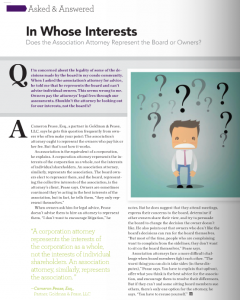 Question: I’m concerned about the legality of some of the decisions made by the board in my condo community. When I asked the association’s attorney for advice, he told me he represents the board and can’t advise individual owners. This seems wrong to me. Owners pay the attorneys’ legal fees through our assessments. Shouldn’t the attorney be looking out for our interest, not the board’s?
Question: I’m concerned about the legality of some of the decisions made by the board in my condo community. When I asked the association’s attorney for advice, he told me he represents the board and can’t advise individual owners. This seems wrong to me. Owners pay the attorneys’ legal fees through our assessments. Shouldn’t the attorney be looking out for our interest, not the board’s?
Answer: Cameron Pease, Esq., a partner in Goldman & Pease, LLC, says he gets this question frequently from owners who often make your point: The association’s attorney out to represent the owners who pay his or her fee. But that’s not how it works.
An association is the equivalent of a corporation, he explains. A corporation attorney represents the interests of the corporation as a whole, not the interest of individual shareholders. An association attorney, similarly, represents the association. The board owners elect to represent them, and the board, representing the collective interests of the association, is the attorney’s client, Pease says. Owners are sometimes convinced they’re acting in the best interests of the association, but in fact, he tells them, “they only represent themselves.”
When owners ask him for legal advice, Pease doesn’t advise them to hire an attorney to represent them. “I don’t want to encourage litigation,” he notes. But he does suggest that they attend meetings, express their concerns to the board, determine if other owners share their view, and try to persuade the board to change the decision the owner doesn’t like. He also points out that owners who don’t like the board’s decisions can run for the board themselves. “But most of the time, people who are complaining want to complain from the sidelines; they don’t want to sit on the board themselves,” Pease says.
Association attorneys face a more difficult challenge when board members fight each other. “The worst thing you can do is take sides ( in these disputes),” Pease says. You have to explain that upfront, offer what you think is the best advice for the association, and encourage them to resolve their differences. But if they can’t and some sitting board members sue others, there’s only one option for the attorney, he says. “You have to recuse yourself.”

